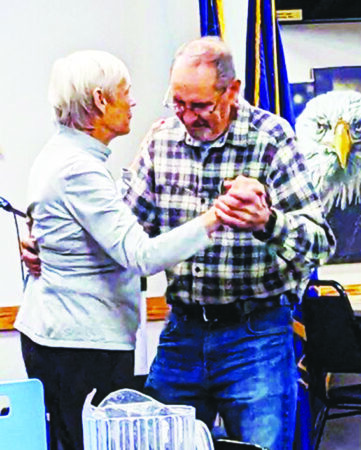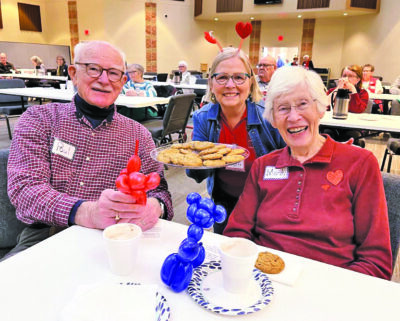- Caregivers and their loved ones dance to familiar, much-loved music during Memory Cafe’s monthly Dine and Dance events at the Moorhead American Legion.
- Memory Cafe volunteer Puffi Cushing serves cookies to Paul and Mardy Dovre at one of its weekly gatherings.
‘People who are forgetting should not be forgotten’
Nancy Edmonds Hanson
Your parent. Your neighbor. Your spouse.
Chances are that you know someone diagnosed with dementia – Alzheimer’s disease or any of the host of brain disorders that lead to memory loss, inability to solve problems and other symptoms. Too often, the life-changing conditions lead to isolation, both for the older adults who are affected and those who care for them.
For the past six years, Memory Cafe of the Red River Valley has been erasing loneliness and providing support for caregivers and their loved ones. The nonprofit organization, primarily run by volunteers, holds weekly sessions full of fellowship and fun, offering a chance to linger, laugh and learn in a safe, warm, welcoming environment with others who are traveling similar journeys.
Memory Cafe sessions – always free and with no registration required – are scheduled every Monday and many Wednesdays at the Hjemkomst Center and Bethel and Hope Lutheran churches, along with the organization’s headquarters at 1122 First Ave. N. in Fargo. Get-togethers include activities for those with memory loss while their caregivers usually meet separately, often for educational sessions on understanding and dealing with dementia. For more information and the full schedule, go to www.MemoryCafeRRV.org.
Meet four of the 5,000 men and women who have participated in Memory Cafe over the past year – two Moorhead couples who agreed to share their stories with the Extra.
‘Grandma Still Loves to Laugh’
Gary Irion and his family began to notice changes in his wife Lee. They began to see subtle shifts in her mood and behavior. She forgot how to do tasks she’d handled effortlessly; her husband, who had never spent time in the kitchen, became the family cook. She wandered restlessly around the yard, following him as he mowed. She left the house and got lost. She talked less and less and, when she spoke, her words seldom made sense.
But Lee Irion, now five years after getting the news that she has Alzheimer’s disease, still loves to laugh.
“It evolved naturally,” Gary remembers. “Sometimes it comes on fast, but for us, it’s been gradual and slow.” Retired from Modern Woodmen of America, a financial services firm, the 77-year-old observed his wife, 73, slowly retreat from the daily routines they’d established since she had left her nursing career with Hospice of the Red River Valley. They slowly traded roles: Now Lee, the lifelong caregiver of the family, was being cared for by her husband.
The symptoms continued to progress. Finally daughter Mary Walmar, who lives next door, took Lee, 73, to the doctor, where she was eventually diagnosed with the most common type of dementia. She has continued to manage her mother’s medical appointments and other care ever since.
As her symptoms progressed, her children began to seek out help that could make life easier for their father, who spends all his days at his wife’s side. They hired a housekeeper to help with housework, then added a second caregiver who comes to their home every week. The two wash clothes, make lunch, feed Lee and help her with personal care. In recent months, two additional caregivers have been added to the regimen.
“We wanted to get as many support systems in place for Papa as we could find,” says daughter-in-law Tammy Irion, who visits every week, often with one or another of her children. She and her family live in Fergus Falls. Gary and Lee’s son Ryan lives in Chicago, taking care of legal matters from a distance.
That’s how they learned about Memory Cafe. The nonprofit, largely volunteer organization operates a full schedule of get-togethers for men and women with dementia and their caregivers. “My friend sang at one of their meetings,” Tammy says. “When I explained that my mother-in-law was having these issues, she recommended we check it out right away.”
At that first meeting last September, co-founder Deb Kaul gave Lee squares of fleece to finger – an immediate hit. “Grandma loves to fidget and sort,” Gary reports. Since then, the two-hour Monday sessions have become a centerpiece of their week. “I drop her off to do little projects – arranging flowers, making small crafts, listening to music,” he says. “Us guys go to a difference room. We sit around and talk and laugh a lot.”
Conversations with other caregivers have helped Gary learn more about his and Lee’s situation. “The nice thing is that if you mention, ‘my spouse did this or that,’ someone else will tell you, ‘mine did the same thing,’” he muses. “It’s almost like there are patterns as it progresses.
“We’re able to talk and laugh with people who know what we’re going through. It’s just great, especially now during the winter when we need a place to go and get out.”
He cites another benefit of the gatherings: “People understand. Whatever her actions or reactions, her temper or mood, they know what’s going on. We don’t need to worry about whether something is acceptable if she’s acting up.”
Music soothes Lee, whether she’s watching videos of hymn singing or dancing to old standards at the monthly Dine and Dance events.
“When you live with somebody with Alzheimer’s, every day is different. You’re always seeing changes. She empties the dishwasher, for example, but then you can’t find the cups.
“Memory Cafe means that I’m not alone. I have friends with the exact same issues. You never think it will happen to you, but then you find out you’re one of many.”
How is he doing, five years into their journey? “I think I’m doing pretty good,” he says after a moment’s reflection. “I’ve come to accept it. This is reality. You’ve got to do the best you can. That’s all that you can do.”
After 55 years of marriage, he says, he has had to realize something important about his wife. “This isn’t really her,” he says. “That’s the worst part. You lose that person. You have no one to sit and talk with as spouses do.”
But, though much is gone, Lee still has her bubbling laugh. “If we couldn’t hear that laugh,” Tammy adds, “it would mean heartbreak.”
‘If Others Can Learn From Us, All the Better’
Mardy Dovre has always been a “people person,” says her husband Paul of his wife of 66 years: “She’s an extrovert with excellent social skills. While her personality has changed somewhat, she still loves to get out with people.”
But cognitive problems began to cast a shadow over her ebullient personality nearly a decade ago. Today, Memory Cafe offers her and her husband – who retired as president of Concordia College 25 years ago – a friendly, pleasant place where they can linger, laugh and learn from others who are coping with the challenges of the group of brain disorders often collectively referred to as Alzheimer’s disease.
“Our children were concerned about her repeating herself and missing things. It seemed worth checking out, so we went to the doctor. That was nine years ago,” Paul says. “He called her condition ‘minimal cognitive disorder,’ and told us we didn’t need another diagnosis unless something dramatic occurred.”
The changes were gradual, “so gradual it’s hard for me to pinpoint them,” he explains, “except that I found myself doing all the cooking, all the washing of clothes, all the housekeeping.”
That was five years ago. Eventually they sought an updated diagnosis. This time, the news was not good: Their physician diagnosed vascular dementia.
That news, Paul adds, was not entirely unexpected. “Mardy’s mother lived with dementia for the last 10 or 12 years of her life.”
The Dovres, who were college sweethearts, had led a busy public life. While Paul was heading the college, his wife taught business classes for several decades at Fargo South High School. “She taught part time in the mornings, then spent the rest of her time at my side at all the college events and gatherings,” he says. “She chaired the Moorhead Healthy Community Initiative and Hospice of the Red River Valley. She was really engaged in a lot of interesting and useful things in the community.
“When I accompanied her, I always enjoyed introducing myself as ‘Mardy Dover’s husband.’”
So social contacts were vital, even as the shadows grew deeper across her cheerful, outgoing presence. Paul first engaged a companion visitor from Home Instead four mornings each week; she and Mardy play cards, do crafts and visit, while the visitor also does light housework. “She would make breakfast or lunch for her, too, but I like to do that,” Paul reports.
The couple learned about Lutheran Social Service of Minnesota’s Morning Out program, where a handful of individuals spend four hours with two volunteers and a staffer one morning per week. They sing, play games and take short walks, Paul says: “Mardy is glad to go. When we depart, there are high-fives and hugs all around.”
An LSS-MN staffer brought up Memory Cafe. At her suggestion, the couple tried it out, and have been going ever since.
“It’s wonderful. They offer support for the caregivers at the same time as activities that engage their spouses,” Paul reports. “They have loads of volunteers helping with the programming. It’s impressive. They do such a good job.”
They are regulars at the Monday afternoon and Wednesday sessions, where Paul and Mardy split up – he to the men’s support group for caregivers, she to activities ranging from gentle exercise and Montessori-style learning techniques to music therapy, creative arts, games, puzzles and socializing.
The Dovres are enthusiastic participants in another activity that grew out of those music therapy sessions. Deb McTaggart directs a choir of 18 to 24 voices that rehearses on Thursdays. “We both have always loved to sing, and she has a wonderful way with us,” he asserts. Among the members are eight Memory Cafe participants, an equal number of caregiving partners, and a handful of volunteers. They’re giving a Christmas concert Sunday, delayed until mid-January by the Christmas rain and ice storm.
Paul says his wife’s condition has slowly taken away many of her favorite pastimes. “She used to read all the time,” he says. “Then she’d read the same thing over and over. Now she doesn’t read at all.
“But she’s still a host. She is open and smiley and out greeting people as always after church on Sundays and at coffee after church. That’s why Morning Out and Memory Cafe have become really important to both of us.”
Paul is not reluctant to talk openly about Mardy’s condition and the changes with which they’ve both coped. “Why hide it? This is a reality,” he explains. “Mardy is still a functioning human being – just different than she was in the past.
“Lots of seniors end up in dementia as a consequence of strokes and other health issues. We have incredible resources in our community like Memory Cafe and Morning Out. I’m hopeful that more people can know and be exposed to what’s here for us.
“If others can learn from Mardy’s and my experience, all the better.”




